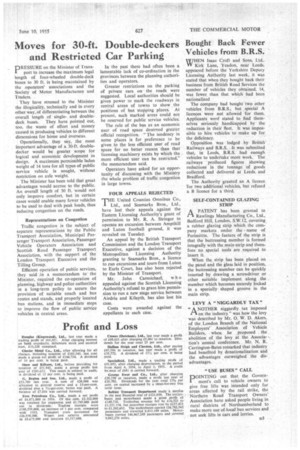Moves for 30-ft. Double-deckers Bought Back Fewer and Restricted Car
Page 61

If you've noticed an error in this article please click here to report it so we can fix it.
Parking Vehicles from 1DR ESSURE on the Minister of Trans' port to increase the maximum legal length of four-wheeled double-deck buses to 30 ft. is being maintained by the operators' associations and the Society of Motor Manufacturers and Traders.
They have stressed to the Minister the illogicality, technically and in every other way, of differentiating between the overall length of singleand doubledeck buses. They have pointed out, too, the waste of effort and money caused in producing vehicles to different dimensions for home and overseas.
Operationally, they say, the most important advantage of a 30-ft. doubledecker would be greater scope for logical and economic development in design. A maximum permissible laden weight of 14 tons for all types of public service vehicle is sought, without restriction on axle weight.
The Minister has been told that great advantages would accrue to the public. An overall length of 30 ft. would not only improve comfort, but in certain cases would enable many fewer vehicles to be used to deal with peak loads, thus reducing congestion on the roads.
Representations on Congestion
Traffic congestion 19 the subject of separate representations by the Public Transport Association, Municipal Passenger Transport Association, Passenger Vehicle Operators Association and Scottish Road Passenger Transport Association, with the support of the London Transport Executive and the Tilling Group.
Efficient operation of public services, they said in a memorandum to the Minister, required the co-operation of planning, highway and police authorities in a long-term policy to secure the provision of suitable coach and bus routes and stands, and properly located bus stations, and in immediate steps to improve the flow of public service vehicles in central areas. In the past there had often been a lamentable lack of co-ordination in the provinces between the planning authorities and operators.
Greater restrictions on the parking of private cars on the roads were suggested. Local authorities should be given power to mark the roadways in central areas of towns to show the positions of bus stopping places. At present, such marked areas could not be reserved for public service vehicles.
The role of the bus as an economic user of road space deserved greater official recognition. "The tendency in some places is for preference to be given to the less efficient user of road space for no better reason than that licensing machinery exists by which the more efficient user can be restricted." the memorandum said.
Operators have asked for an opportunity of discussing with the Ministry the whole problem of traffic congestion in large towns.
FOUR APPEALS REJECTED
TliUnited Counties Omnibus Co., Ltd., and Seamarks Bros., Ltd., have lost their appeals against the Eastern Licensing Authority's grant of permission to Mr. R. A. Stringer to operate an excursion between Ampthill and Luton football ground, it was revealed on Tuesday.
An appeal by the British Transport Commission and the London Transport Executive, against a decision of the Metropolitan Licensing Authority granting to Seamarks Bros., a licence to run excursions and tours from Luton to Earls Court, has also been rejected by the Minister of Transport.
Mr. John Carmichael, w h o appealed against the Scottish Licensing Authority's refusal to grant him permission to run a new stage service between Airdrie and Kilayth, has also lost his case.
Costs were awarded against the appellants in each case.
ly/HEN Isaac Croft and Sons, Ltd.. VV Kirk Lane, Yeadon, near Leeds, appeared before the Yorkshire Deputy
Licensing Authority last week, it was stated that when they bought back their business from British Road Services the number of vehicles they obtained, 14. was fewer than that which had been nationalized The company had bought two other vehicles from B.R.S., but special A licences were not allowed for them. Applicants were stated to find themselves seriously handicapped by the reduction in their fleet. It was impossible to hire vehicles to make up for the deficiency.
Opposition was lodged by British' Railways and B.R.S. It was submitted that, in Leeds, B.R.S. had enough vehicles to undertake more work. The railways produced figures showing reductions in the tonnage of goods collected and delivered at Leeds and Bradford.
The Authority granted an A licence for two additional vehicles, but refused a B licence for a third.
SELF-CONTAINED GLAZING STRIP
In.A PATENT has been granted to Rawlings Manufacturing Co., Ltd., Bedford Hill, London, S.W.I 2, covering a rubber glazing strip which the cornpany markets under the • name of Perimitite. The feature of the strip is that the buttressing member is formed integrally with the main strip and therefore no special tools are required to insert it.
When the strip has been placed on the panel and the glass laid in position, the buttressing member can be quickly inserted by drawing a screwdriver or other suitable implement along the member which becomes securely locked in a specially shaped groove in the main strip.
LEVY A "NIGGARDLY TAX" A NOTHER niggardly tax imposed I—I on the industry." was how the levy was described by Mr. 0. W. D. Akers, of the London Branch of the National Employers' Association of Vehicle Builders, when he proposed the abolition of the levy at the Association's annual conference. Mr. N. R. Carrington-Bates remarked that industry had benefited by denationalization and the advantages outweighed the disadvantages.
"USE RUSES" CALL
POINTING out that the Government's call to vehicle owners to give free lifts was intended only for areas affected by the rail strike, the Northern Road Transport Owners' Association have asked people living in rural districts of Northumberland to make more use of local bus services and not seek lifts in cars and lorries.




























































































































































